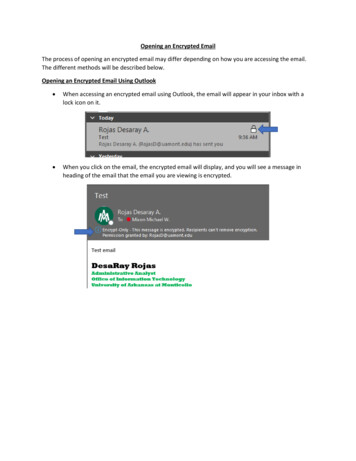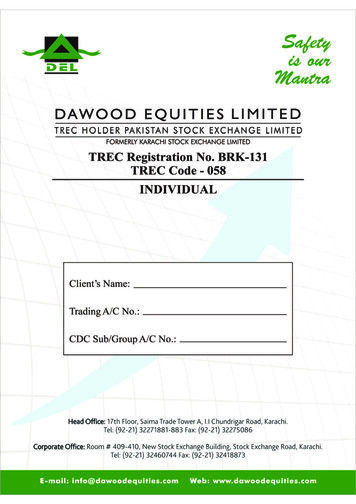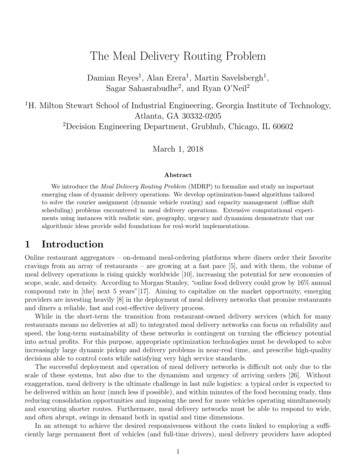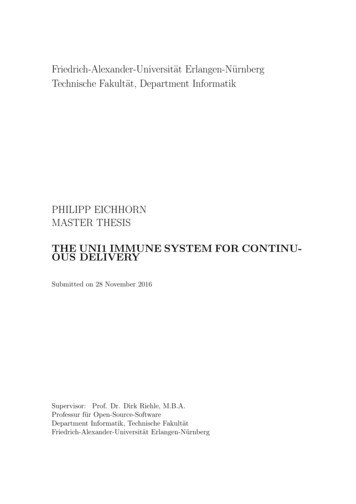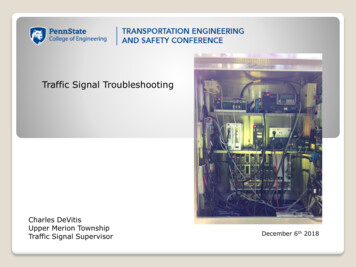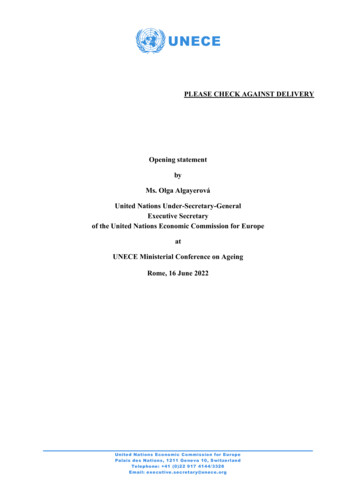
Transcription
PLEASE CHECK AGAINST DELIVERYOpening statementbyMs. Olga AlgayerováUnited Nations Under-Secretary-GeneralExecutive Secretaryof the United Nations Economic Commission for EuropeatUNECE Ministerial Conference on AgeingRome, 16 June 2022United Nations Economic Commission for EuropePalais des Nations, 1211 Geneva 10, SwitzerlandTelephone: 41 (0)22 917 4144/3328Email: executive.secretary@unece.org
Page 2Minister Elena Bonetti, Excellencies, distinguished delegates, dearcolleagues,I welcome you all,o representatives of the member States,o experts of the scientific community and members of civil society,o as well as colleagues from international organisations,to this Ministerial Conference on Ageing.The theme of the Conference is:A sustainable world for all ages: Joining forces for solidarity and equalopportunities throughout lifeThere is a lot of work to be done behind these words.They call on all of us to work together and create societies for all ages, andfor both the current and the future generations.Over the next two days, our discussions will focus on different aspects of thisjoint effort:o First - Promoting active and healthy ageing throughout life,o Second - Ensuring access to long-term care and support for carers andfamilies, ando Third - Mainstreaming ageing to advance a society for all ages.Let me say a few words about each of these three elements.1.Promoting active and healthy ageing throughout life begins with the recognition that every human being at any point of their livesis ageing. And that the experiences, skills, attitudes, but also disadvantages weaccumulate from early childhood are determining for our quality of life at olderage.It is essential that we do not limit ageing to older persons, pensions andcare, but focus on the entire life course. We need to recognise that preventionand creating equal opportunities in all fields of life are important prerequisitesfor health, participation and income security at older age.A second important point here is the mutually reinforcing nature of activeageing and healthy ageing.10 years ago, the UNECE member States strongly endorsed the concept ofactive ageing in the Vienna Ministerial Declaration. Since then, many countrieshave shaped their policies and programmes to promote active ageing. At thesame time, the currently ongoing United Nations Decade of Healthy Ageing hasfocused attention at ageing in good health, with action plans and initiatives
Page 3spreading across our region.I would like to stress that active ageing and healthy ageing cannot existwithout each other. Active participation in society, longer working life, activesupport to family members, or participation in lifelong learning at older age areall, to a certain degree, dependent on good health. On the other hand, activelifestyle, engagement in the community and strong social connections canpositively influence our prospects for ageing in good health.We cannot pretend that by living actively we could certainly avoid all the healthproblems commonly associated with older age. But we can reduce thelimitations they cause. This is where creating a world for all ages comes instrongly. It is a world in which homes, transport systems, workplaces, products,services and communities are built in a way that enables independence, choiceand active participation at any age, even when health declines.Now let me turn to our second priority area.2.Ensuring access to long-term care and support for carers and families. is crucial in our ageing societies.Long-term care needs and the demand for well-trained health and socialcare workers is rising rapidly in many countries of our region. To keep upwith this demand, several countries have adopted systemic reforms andinnovative approaches, but there is still a long way ahead of us. Take, forinstance, the availability of long-term care services. Often they are limited tocities or larger settlements, leaving older persons in rural and deprived areasbehind.A second important factor to consider is quality. Mechanisms need to beestablished to ensure that older persons, regardless of their income, can accessthe same minimum quality standards in care. Dignity and self-determination inlong-term care settings have to be uphold as well. This also includes thepossibility of choice – some older persons wish to receive care at home, whileothers may opt for supported housing or residential facilities – but theirpreferences should be respected at all times.COVID-19 has taught us many lessons about long-term care and held up amirror to the flaws of our health and social care systems. It revealed the greatdependence of our long-term care systems on the dedication of careprofessionals, and especially of informal carers and families.Now that the pandemic has finally ceased to dominate our agendas, we shouldnot forget what it taught us, and we should take all the necessary steps to bebetter prepared for potential future health crises. This includes improving theworking conditions of care workers, ensuring adequate staffing, and creatingcomprehensive support frameworks for informal and family carers that help to
Page 4reconcile paid employment and care responsibilities.Finally, our third priority, and some would say the most important.3.Mainstreaming ageing to advance a society for all ages touches upon everything I mentioned before. It is about how to make “aworld for all ages” happen.Mainstreaming ageing in simple words means taking into consideration the factof population ageing in policy making in all sectors, such as health, education,transport, housing, energy, and even tourism to mention only a few.Mainstreaming ageing needs to happen:o at all levels – national, regional and local;o and with all stakeholders, such as civil society, social partners, serviceproviders, the private sector, researchers. And importantly, with olderpersons themselves.***Excellencies, dear colleagues,We have convened here in Rome this week to review what has been achievedover the last five years in implementing the goals of the Lisbon MinisterialDeclaration.In 2017, in Lisbon, UNECE member States pledged to realize the potential ofliving longer. I am very pleased to be able to say that many policies have sincebeen adopted and action taken to turn this promise into reality.Population ageing is a policy challenge that we all face.Regional cooperation enables us to learn from each other’s successes andfailures, and I highly appreciate your continued commitment to the mechanismsfor regional cooperation that we have put in place.Your numerous and high-level presence here in Rome is testimony to it.The UNECE Standing Working Group on Ageing, established nearly 15years ago, is a unique intergovernmental platform for cooperation and exchangeon implementing the Madrid International Plan of Action on Ageing and itsRegional Implementation Strategy.Its recent change of status from an "ad hoc" to a "standing" working group witha long-term mandate is testimony to the importance of population ageing for theregion. It also demonstrates member States’ recognition of the value of regionalcooperation in this field.Finally, I would like to note that reliable and relevant data are essential formaking the right decisions at the right time. The COVID-19 has highlighted theimportance of having accurate information almost in real time. UNECE isactively engaged in advancing ageing-related statistics. We are happy to see that
Page 5many of you continue to refer to the Active Ageing Index, which is a uniquetool in the area of ageing-related statistics.Excellencies, dear colleagues,I would like to take this opportunity to thank Italy for hosting the Conferenceand for providing us with an opportunity to finally meet face to face in the“Eternal City” of Rome.I would also like to thank the members of the UNECE Standing WorkingGroup on Ageing and all our partners with whom we share a commoncommitment to work towards a sustainable world for all ages, including UNFPA,WHO, and the many partners representing civil society and the researchcommunity.I wish you all a fruitful and engaging exchange over the next two days!
United Nations Economic Commission for Europe Palais des Nations, 1211 Geneva 10, Switzerland Telephone: 41 (0)22 917 4144/3328 Email: executive.secretary@unece.org

